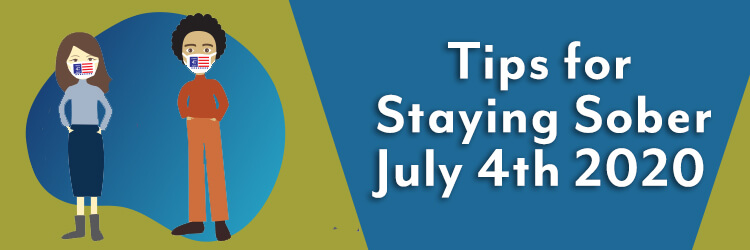In a study of beer consumption per holiday by The National Beer Wholesalers Association, Fourth of July was number one. The 2016 study broke down at-home vs. on-premise sales, which ended up being prescient. While July 4th was actually number eight for beer sales at any kind of establishment, it was first for at-home sales—even before the pandemic.
Bars are open in some places, but social distancing is still a thing. Homes across the country will likely be filled with Fourth of July partiers (and tons of beer). Americans spend a total of $1.6 billion on beer and wine for this holiday.
It’s okay to be unsure how celebration fits with your recovery. This upcoming Fourth of July will be my fifth one sober, so I thought I’d share some tips on how I’ve made it through (and still had fun!). I also want to note that this is the first Fourth of July most of us have celebrated in a global pandemic, so we need to be extra vigilant for any impulse to drink.
The first thing to do is prepare. Pick one or several supportive friends—bonus if they are in recovery too—and ask if they can be “on call” for you that day. This just means that if you call, they will pick up. Anyone willing to be that person probably knows why you’re sober and can remind you. It will be comforting to know in advance your support system has your back. You might even bring a sober friend or two wherever you’re going. Having even one other sober person at an event can give you both strength.
You also want to be prepared with a non-alcoholic beverage. It can feel very awkward to be empty-handed when everyone else is holding a drink; you don’t know what to do with your hands. It may sound silly or small, but having something to hold has actually been one of the most helpful things for me at parties.
I’m lucky that at this point a lot of my friends keep seltzer for me, but that’s not always the case. There might be non-alcoholic beverages where you’re going, but you don’t want to assume and end up with nothing. Pick a favorite cool, refreshing drink—there’s no reason you can’t have a celebratory beverage, even if it’s not alcohol.
Another way to plan is to make a list of things that help calm you down. This might be taking a walk, calling a friend, playing a game on your phone, etc. It helps to have ideas in advance so you’re not scrambling to think of something in a moment of stress. This is also useful if confrontation is hard for you. For instance, if walks are calming, but the idea of telling people why you need to walk is nerve-wracking, you can plan talking points in advance.
This applies to your response if someone asks why you’re not drinking. If you don’t feel comfortable sharing about your recovery, plan what you will say if asked. Many people aren’t used to seeing someone sober at a party—especially a holiday party—and they may ask questions.
That said, while I’ve been upfront about my sobriety from the beginning—drunk people don’t usually notice what you’re drinking. Acquaintances who had liked my social media posts about sobriety have made comments at parties indicating they think we’re both drinking. If you don’t want to be out about sobriety, be prepared with a response, but let it be a comfort that most people aren’t paying attention.
If you’re having cravings, you might suggest other activities like board games, cornhole or another outdoor game—anything so that the focus isn’t on drinking. This will help distract you, and might make the event more fun anyway.
If none of these tips work, it’s okay to leave (or not go out in the first place). You might have an escape plan, especially if leaving early is difficult for you. You don’t owe it to anyone to stay in an environment causing you stress. But you do owe it to yourself to do what’s best for your recovery.
If you are struggling with a substance use or mental health disorder as we head into Fourth of July and any time during the pandemic, there is hope. TruHealing Centers is open, with hospital-grade sanitization and telehealth options. At our recovery centers across the country, we will help you build healthy coping skills so that you can thrive in long-term recovery. Call an admissions specialist at 410-593-0005.









